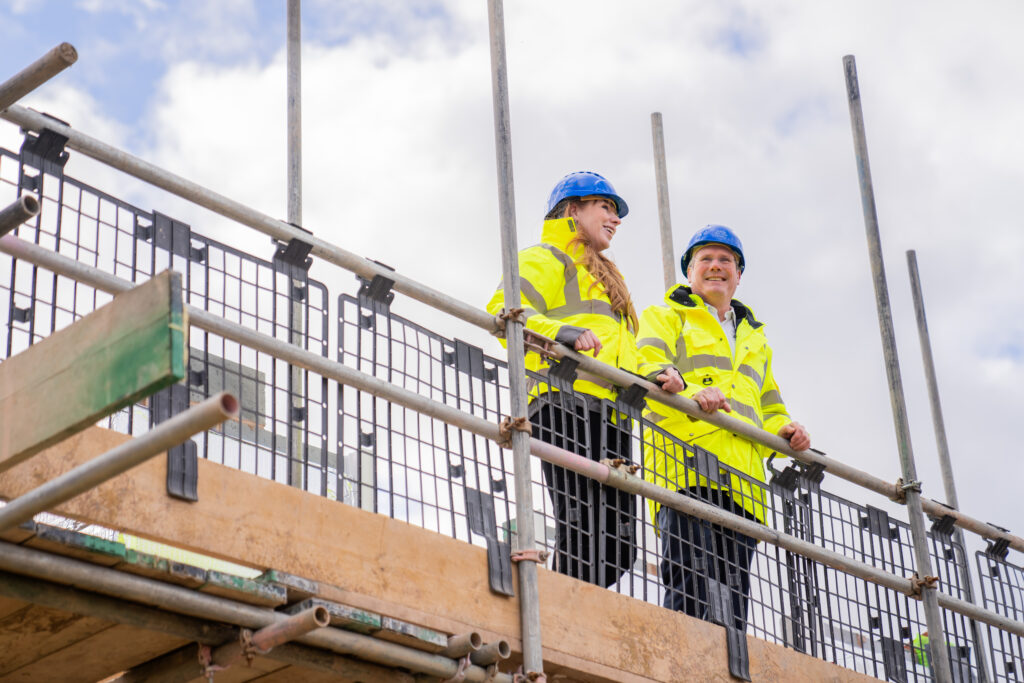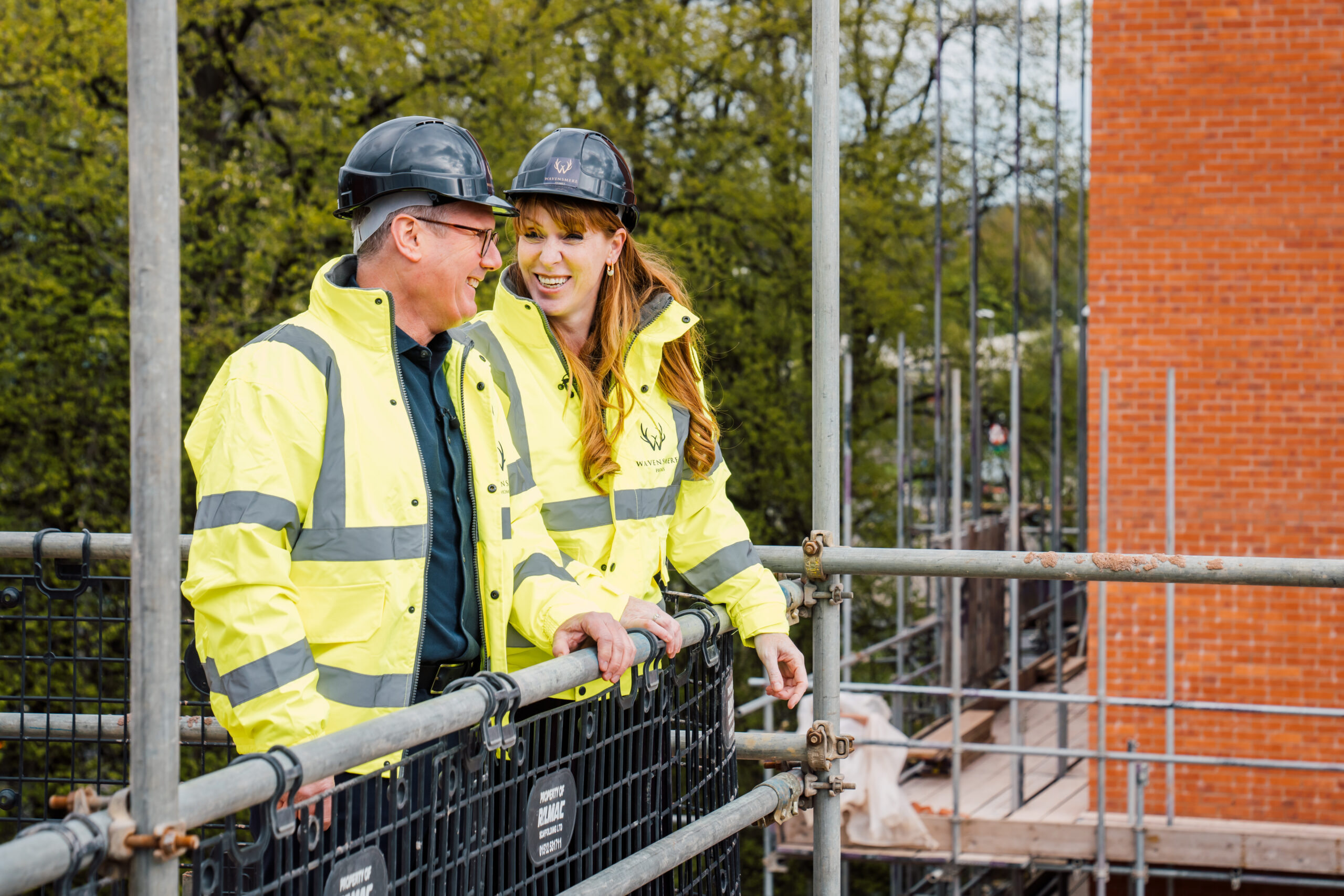Kickstart economic growth

How Labour will kickstart economic growth:
- Deliver economic stability with tough spending rules
- A new partnership with business to boost growth everywhere
- A National Wealth Fund to invest in jobs
- Planning reform to build 1.5 million new homes
- Devolution of power across England
- A New Deal for Working People
Skip to:
Sustained economic growth is the only route to improving the prosperity of our country and the living standards of working people. That is why it is Labour’s first mission for government. It means being pro-business and pro-worker. We are the party of wealth creation.
This election follows the chaos of the Conservatives’ ‘mini-budget’ and an unprecedented fall in living standards. Their miserable economic record over the past 14 years has seen productivity and wages flatlining, leaving British families significantly poorer than those in France or Germany.
This decline is rooted in two failures.
First, an inability to accept that a strong economy can only be built on the contribution of every community and every person – the many not the few. Second, a failure to acknowledge that sustainable growth requires government to be a strategic partner with business – that markets must be shaped, not merely served.
These twin failures have led to greater economic insecurity – in the financial resilience of households, but also in our national economy – at the very time when our world has become less stable and secure. The Conservatives have failed to grasp the implications of a new era of rising global competition and tension, instead leaving our economy on an increasingly shallow and insecure footing.
It is time to turn the page. Labour will restore stability, increase investment, and reform our economy.
We will embrace a new approach to economic management – securonomics – that understands sustainable growth relies on a broad base and resilient foundations. Our approach will depend on a dynamic and strategic state. This does not mean ever-growing government, but it does mean a more active, smarter government that works in partnership with business, trade unions, local leaders, and devolved governments.
Labour will stop the chaos and support business through a stable policy environment – strengthening our economic institutions, and giving investors the certainty they need to fuel growth. Labour will seek involvement from industry, trade unions, and civil society in our plans for growth, so they can contribute to building a stronger economy in all parts of the country. We will strategically use public investment where it can unlock additional private sector investment, create jobs, and provide a return for taxpayers.
While stability and greater investment will support growth, parts of our economy require substantial reform if we are to create the wealth our country needs. Britain is hampered by a planning regime that means we struggle to build either the infrastructure or housing the country needs.
The country remains too centralised, with the economic potential of too many regions and communities ignored. Our labour market fails to provide secure jobs and, as a result, for far too many people work does not pay.
The innovation, dynamism and sheer hard work of British business and workers has never been in question. The next Labour government will partner with them to kickstart economic growth and rebuild Britain.
“Labour’s plan for the economy is good news for my customers and colleagues in high streets across the country. Labour will bring stability, good jobs and higher living standards. As a business leader, I am sick and tired of chaos under the Conservatives. I am absolutely convinced that Keir Starmer is the leader to deliver the change this country needs. Labour will end division, strengthen our communities and protect the environment. That’s why I’ll be voting Labour and I urge you to do the same.”
– Richard Walker OBE, Executive Chairman of Iceland
Strategic partnership through industrial strategy
Labour will introduce a new industrial strategy. Our approach will be mission-driven and focused on the future. We will work in partnership with industry to seize opportunities and remove barriers to growth. Critically, we will end short-term economic policy making with the establishment of an Industrial Strategy Council, on a statutory footing, to provide expert advice. We will ensure representation on the Council from all nations and regions, business and trade unions, to drive economic growth in all parts of the country.
Labour will take a sectoral approach and be clear-eyed about where the UK enjoys advantages over other countries. Our approach will back what makes Britain great: our excellent research institutions, professional services, advanced manufacturing, and creative industries. We will ensure a pro-business environment, with a competition and regulatory framework, that supports innovation, investment, and high-quality jobs. Procurement and trade policy will also be aligned with our industrial strategy priorities.
Financial services are one of Britain’s greatest success stories. Labour will create the conditions to support innovation and growth in the sector, through supporting new technology, including Open Banking and Open Finance and ensuring a pro-innovation regulatory framework.
Our other great British industries need certainty over the policies that will apply to them. In opposition, Labour has worked with the automotive, life sciences, and creative sectors, on the approach we will take to policy. In government, we will set out plans for these and other vital sectors of the economy.
Boosting investment
Business has for too long been hampered by a government that does not work with it. As a result, investment in the UK is too low. To address this long-standing problem Labour will use every available lever. Public investment, where it supports and de-risks additional private investment, is one important tool being used successfully across the world. It can create good jobs across the country and would mean British taxpayers can reap the benefits of economic growth. To realise these opportunities Labour will establish a National Wealth Fund.
Capitalised with £7.3 billion over the course of the next Parliament, the National Wealth Fund will have a remit to support Labour’s growth and clean energy missions, making transformative investments across every part of the country. The fund will have a target of attracting three pounds of private investment for every one pound of public investment, creating jobs across the country. We plan to allocate:
- £1.8 billion to upgrade ports and build supply chains across the UK
- £1.5 billion to new gigafactories so our automotive industry leads the world
- £2.5 billion to rebuild our steel industry
- £1 billion to accelerate the deployment of carbon capture
- £500 million to support the manufacturing of green hydrogen.
Labour will also act to increase investment from pension funds in UK markets. We will adopt reforms to ensure that workplace pension schemes take advantage of consolidation and scale, to deliver better returns for UK savers and greater productive investment for UK PLC. We will also undertake a review of the pensions landscape to consider what further steps are needed to improve pension outcomes and increase investment in UK markets.
Labour’s first steps for change: delivering economic stability
Business taxation
The business tax regime matters for investors. It is not just the rates of tax that matter, but also certainty. Under the Conservatives there has been constant chopping and changing – corporation tax has changed 26 times – and multiple fiscal events have made drastic changes often at little notice.
Labour will stop the chaos, and turn the page with a strategic approach that gives certainty and allows long-term planning. We are committed to one major fiscal event a year, giving families and businesses due warning of tax and spending policies. We will publish a roadmap for business taxation for the next parliament which will allow businesses to plan investments with confidence.
Labour will cap corporation tax at the current level of 25 per cent, the lowest in the G7, for the entire parliament, and we will act if tax changes in other countries pose a risk to UK competitiveness. We will retain a permanent full expensing system for capital investment and the annual investment allowance for small business. And we will give firms greater clarity on what qualifies for allowances to improve business investment decisions.
The current business rates system disincentivises investment, creates uncertainty and places an undue burden on our high streets. In England, Labour will replace the business rates system, so we can raise the same revenue but in a fairer way. This new system will level the playing field between the high street and online giants, better incentivise investment, tackle empty properties and support entrepreneurship.

Economic infrastructure
Britain is grinding to a halt. Rail cancellations are at record levels, energy prices have risen faster here than in any other country in Western Europe, and not a single reservoir has been built in the last 30 years. This is not an accident. Conservative chaos has seen major projects abandoned, decades-long delays, cost overruns, uncertainty for supply chains, and our infrastructure crumbling.
Labour will end this chaos by developing a ten-year infrastructure strategy, aligned with our industrial strategy and regional development priorities, including improving rail connectivity across the north of England. The strategy will guide investment plans and give the private sector certainty about the project pipeline. We will work closely with business to map and address the delivery challenges we face. We will create a new National Infrastructure and Service Transformation Authority, bringing together existing bodies, to set strategic infrastructure priorities and oversee the design, scope, and delivery of projects.
The current planning regime acts as a major brake on economic growth. Labour will make the changes we need to forge ahead with new roads, railways, reservoirs, and other nationally significant infrastructure. We will set out new national policy statements, make major projects faster and cheaper by slashing red tape, and build support for developments by ensuring communities directly benefit. We will also update national planning policy to ensure the planning system meets the needs of a modern economy, making it easier to build laboratories, digital infrastructure, and gigafactories. Labour will ensure economic regulation supports growth and investment, promotes competition, works for consumers, and enables innovation.
In an ever more connected world, Britain’s communication network is also vital. Under the Conservatives, investment in 5G is falling behind other countries and the rollout of gigabit broadband has been slow. Labour will make a renewed push to fulfil the ambition of full gigabit and national 5G coverage by 2030.
Royal Mail remains a key part of the UK’s infrastructure. Labour will ensure that any proposed takeover is robustly scrutinised and that appropriate guarantees are forthcoming that protect the interests of the workforce, customers and the United Kingdom, including the need to maintain a comprehensive universal service obligation.
Labour will also explore new business and governance models for Royal Mail so that workers and customers who rely on Royal Mail services can have a stronger voice in the governance and strategic direction of the company.
“Change is overdue”
Charlie, cafe owner and former Conservative voter
A modern transport network
Rebuilding Britain means modernising our transport infrastructure. Our road network is plagued by long-promised projects that are never delivered. The potholes cratering our roads are a visible sign of the decline after 14 years of Conservative rule.
Cars remain by far the most popular form of transport. Labour will maintain and renew our road network, to ensure it serves drivers, cyclists and other road users, remains safe, and tackles congestion. We will fix an additional one million potholes across England in each year of the next parliament, funded by deferring the A27 bypass, which is poor value for money. Labour will further support drivers by tackling the soaring cost of car insurance. And, as set out in our automotive sector plan, Labour will support the transition to electric vehicles by accelerating the roll out of charge points, giving certainty to manufacturers by restoring the phase-out date of 2030 for new cars with internal combustion engines, and supporting buyers of second-hand electric cars by standardising the information supplied on the condition of batteries.
Labour will overhaul Britain’s railways. Fourteen years of Conservative neglect have failed passengers, businesses and taxpayers. We will put passengers at the heart of the service by reforming the railways and bringing them into public ownership. We will do this as contracts with existing operators expire or are broken through a failure to deliver, without costing taxpayers a penny in compensation. Great British Railways will deliver a unified system that focuses on reliable, affordable, high-quality, and efficient services; along with ensuring safety and accessibility. It will be responsible for investment, day-to-day operational delivery and innovations and improvements for passengers, working with publicly-owned rail operators in Wales and Scotland. Mayors will have a role in designing the services in their areas. There will be a duty to promote and grow the use of rail freight. Open access operators are an important part of the rail system and will have an ongoing role. Labour will also create a tough new passenger watchdog, focused on driving up standards.
Local communities have lost control over their bus routes. Fares have increased, routes have disappeared, and services are unreliable. Building on the work of Labour mayors, we will reform the broken system through new powers for local leaders to franchise local bus services, and we will lift the ban on municipal ownership. This will give local communities in England control over routes and schedules.
Under the Conservatives, transport services have remained fragmented and inefficient with companies and sectors failing to speak to and plan with each other. Labour will give mayors the power to create unified and integrated transport systems, allowing for more seamless journeys, and to promote active travel networks. Labour will also develop a long-term strategy for transport, ensuring transport infrastructure can be delivered efficiently and on time. Labour will secure the UK aviation industry’s long-term future, including through promoting sustainable aviation fuels, and encouraging airspace modernisation.

Driving innovation
Delivering growth and raising productivity depend on fresh thinking and new ideas. Britain has many cutting-edge businesses, but innovation needs to be converted into commercial success in every corner of our country. Labour will make Britain the best place to start and grow a business.
We will ensure our industrial strategy supports the development of the Artificial Intelligence (AI) sector, removes planning barriers to new datacentres. And we will create a National Data Library to bring together existing research programmes and help deliver data-driven public services, whilst maintaining strong safeguards and ensuring all of the public benefit.
Labour will scrap short funding cycles for key R&D institutions in favour of ten-year budgets that allow meaningful partnerships with industry to keep the UK at the forefront of global innovation. We will work with universities to support spinouts; and work with industry to ensure start-ups have the access to finance they need to grow. We will also simplify the procurement process to support innovation and reduce micromanagement with a mission-driven approach.
Regulators are currently ill-equipped to deal with the dramatic development of new technologies, which often cut across traditional industries and sectors. Labour will create a new Regulatory Innovation Office, bringing together existing functions across government. This office will help regulators update regulation, speed up approval timelines, and co-ordinate issues that span existing boundaries. Labour will ensure the safe development and use of AI models by introducing binding regulation on the handful of companies developing the most powerful AI models and by banning the creation of sexually explicit deepfakes.
Labour will support diverse business models which bring innovation and new products to the market. This includes the co-operative sector, and we will aim to double the size of the UK’s co-operative and mutuals sector. We will work with the sector to address the barriers they face, such as accessing finance.

Support for small business and the self-employed
Labour’s plan for economic growth has been developed for all UK businesses. But small firms, entrepreneurs, and the self- employed face unique challenges. That is why, in partnership, Labour has developed a plan for small businesses – the lifeblood of communities and high streets across the country.
We will take action on late payments to ensure small businesses and the self-employed are paid on time. We will improve guidance and remove barriers to exporting for small businesses. Reform of the British Business Bank, including a stronger mandate to support growth in the regions and nations, will make it easier for small and medium sized enterprises to access capital. We will also reform procurement rules to give them greater access to government contracts.
The Post Office is an essential service in communities across the country. Labour will look for ways to strengthen the Post Office network, in consultation with sub-postmasters, trade unions and customers, and support the development of new products, services and business models, such as banking hubs, that will help reinvigorate the high street. We will also ensure justice and compensation are delivered swiftly for those sub-postmasters shamefully affected by the Horizon IT scandal.

Get Britain building again
The dream of homeownership is now out of reach for too many young people. The Conservatives have failed to act even though the housing crisis is well known to be one of the country’s biggest barriers to growth. Labour will get Britain building again, creating jobs across England, with 1.5 million new homes over the next parliament.
We will immediately update the National Policy Planning Framework to undo damaging Conservative changes, including restoring mandatory housing targets. We will take tough action to ensure that planning authorities have up-to-date Local Plans and reform and strengthen the presumption in favour of sustainable development. Labour will support local authorities by funding additional planning officers, through increasing the rate of the stamp duty surcharge paid by non-UK residents. We will ensure local communities continue to shape housebuilding in their area, but where necessary Labour will not be afraid to make full use of intervention powers to build the houses we need.
Labour will take a brownfield first approach, prioritising the development of previously used land wherever possible, and fast-tracking approval of urban brownfield sites. But brownfield development alone will not be enough to meet our housing need.
Labour is committed to preserving the green belt which has served England’s towns and cities well over many decades. Under the Conservatives, greenbelt land is regularly released for development but haphazardly and often for speculative housebuilding. Without changing its purpose or general extent, Labour will take a more strategic approach to greenbelt land designation and release to build more homes in the right places. The release of lower quality ‘grey belt’ land will be prioritised and we will introduce ‘golden rules’ to ensure development benefits communities and nature.
In partnership with local leaders and communities, a Labour government will build a new generation of new towns, inspired by the proud legacy of the 1945 Labour government. Alongside urban extensions and regeneration projects, these will form part of a series of large-scale new communities across England.
Housing need in England cannot be met without planning for growth on a larger than local scale so we will introduce effective new mechanisms for cross-boundary strategic planning. Labour will require all Combined and Mayoral Authorities to strategically plan for housing growth in their areas. We will give Combined Authorities new planning powers along with new freedoms and flexibilities to make better use of grant funding.
Labour will further reform compulsory purchase compensation rules to improve land assembly, speed up site delivery, and deliver housing, infrastructure, amenity, and transport benefits in the public interest. We will take steps to ensure that for specific types of development schemes, landowners are awarded fair compensation rather than inflated prices based on the prospect of planning permission.
Labour will deliver the biggest increase in social and affordable housebuilding in a generation. We will strengthen planning obligations to ensure new developments provide more affordable homes; make changes to the Affordable Homes Programme to ensure that it delivers more homes from existing funding; and support councils and housing associations to build their capacity and make a greater contribution to affordable housing supply. Labour will prioritise the building of new social rented homes and better protect our existing stock by reviewing the increased right to buy discounts introduced in 2012 and increasing protections on newly-built social housing.
Labour wants exemplary development to be the norm not the exception. We will take steps to ensure we are building more high-quality, well-designed, and sustainable homes and creating places that increase climate resilience and promote nature recovery. We will implement solutions to unlock the building of homes affected by nutrient neutrality without weakening environmental protections.
Labour will work with local authorities to give first-time buyers the first chance to buy homes and end the farce of entire developments being sold off to international investors before houses are even built. And we will introduce a permanent, comprehensive mortgage guarantee scheme, to support first-time buyers who struggle to save for a large deposit, with lower mortgage costs.

Economic growth across the country
Every town and city across the country has a vital contribution to make to our economy. But too many areas have been held back because decisions are often taken in Westminster, and not by local leaders who understand local ambitions and strengths. This means we fail to make the most of the contribution everyone can make, hampering economic growth. So, Labour will transfer power out of Westminster, and into our communities, with landmark devolution legislation to take back control.
In England, Labour will deepen devolution settlements for existing Combined Authorities. We will also widen devolution to more areas, encouraging local authorities to come together and take on new powers. Towns and cities will be able to take hold of the tools they need to pursue growth, create jobs, and improve living standards. Local areas will be able to gain new powers over transport, adult education and skills, housing and planning, and employment support. We will ensure those places have the strong governance arrangements, capacity, and capability to deliver, providing central support where needed.
At the centre of our approach is a new statutory requirement for Local Growth Plans that cover towns and cities across the country. Local leaders will work with major employers, universities, colleges, and industry bodies to produce long-term plans that identify growth sectors and put in place the programmes and infrastructure they need to thrive. These will align with our national industrial strategy.
Labour will review the governance arrangements for Combined Authorities to unblock decision making. We will provide greater flexibility with integrated settlements for Mayoral Combined Authorities that can show exemplary management of public money. On housing and planning we will seek to consolidate powers to allow for improved decision making.
Our approach will require partnership with local authorities. Local government is facing acute financial challenges because of the Conservatives’ economic mismanagement which sent interest rates soaring, along with their failures on public services. To provide greater stability, a Labour government will give councils multi-year funding settlements and end wasteful competitive bidding. We recognise good jobs deliver better services that local communities can rely on. Labour will provide capacity and support to councils, and will overhaul the local audit system, so taxpayers get better value for money.
Improving public services is essential to growing our economy across the country. Public service workers have a critical role to play, but services are suffering from recruitment and retention crises. Labour will act to improve public service workers’ living standards throughout the parliament, and ensure any independent mechanisms have the confidence of all involved.
Labour will also work with the Scottish and Welsh Governments, and the Northern Ireland Executive, to drive growth across the country. Our industrial strategy will support successful industries across all nations of the UK.

A fair and properly managed immigration system
People who have come to the UK to work make a substantial contribution to our economy, our public services, and our communities.
But under the Conservatives, our economy has become overly dependent on workers from abroad to fill skills shortages. As a result, we have seen net migration reach record highs; more than triple the level than at the last election in 2019. The overall level must be properly controlled and managed. Failure to do so reduces the incentives for businesses to train locally. So, Labour will reduce net migration.
We will reform the points-based immigration system so that it is fair and properly managed, with appropriate restrictions on visas, and by linking immigration and skills policy. Labour will not tolerate employers or recruitment agencies abusing the visa system. And we will not stand for breaches of employment law. Employers who flout the rules will be barred from hiring workers from abroad.
Conservative policy is incoherent, with decisions on migration, skills and sectoral pay determined in isolation. Labour will bring joined-up thinking, ensuring that migration to address skills shortages triggers a plan to upskill workers and improve working conditions in the UK. We will strengthen the Migration Advisory Committee, and establish a framework for joint working with skills bodies across the UK, the Industrial Strategy Council and the Department for Work and Pensions. We will end the long-term reliance on overseas workers in some parts of the economy by bringing in workforce and training plans for sectors such as health and social care, and construction.
The days of a sector languishing endlessly on immigration shortage lists with no action to train up workers will come to an end.

Supporting people into work
Too many people are out of work or not earning enough. Long waits for treatment of health conditions, particularly mental health, are contributing to the rise in economic inactivity. Labour will reform employment support so it drives growth and opportunity. Our system will be underpinned by rights and responsibilities – people who can work, should work – and there will be consequences for those who do not fulfil their obligations.
We will bring Jobcentre Plus and the National Careers Service together to provide a national jobs and careers service, focused on getting people into work and helping them get on at work. We will ensure the service is responsive to local employers, inclusive for all users, and works in partnership with other local services.
Labour will work with local areas to create plans to support more disabled people and those with health conditions into work. We will devolve funding so local areas can shape a joined-up work, health, and skills offer for local people. We will tackle the backlog of Access to Work claims and give disabled people the confidence to start working without the fear of an immediate benefit reassessment if it does not work out. We believe the Work Capability Assessment is not working and needs to be reformed or replaced, alongside a proper plan to support disabled people to work.
One in eight young people are not in education, employment, or training, with those lacking good qualifications and with poor mental health facing particular disadvantages. Drawing together existing funding and entitlements, Labour will establish a youth guarantee of access to training, an apprenticeship, or support to find work for all 18- to 21-year-olds, to bring down the number of young people who are not learning or earning. We will also guarantee two weeks’ worth of work experience for every young person, and improve careers advice in schools and colleges.
We will work with the Scottish and Welsh Governments, and Mayors and Combined Authorities in England, to ensure all aspects of our new approach to Jobcentre Plus and employment support partner effectively with devolved provision, to offer the best opportunities for people right across the country.

Making work pay
Greater in-work security, better pay, and more autonomy in the workplace improve the lives of working people and bring substantial economic benefits. Britain’s outdated employment laws are not fit for the modern economy, and recent Conservative legislation has fuelled hostility and confrontation leading to the worst period in industrial relations since the 1980s.
For too many people a job does not offer the route out of poverty it should: either because work is insecure, inflexible, or low paid; or because people face barriers when trying to move into a better job. Responsible businesses face being undercut when rights are not enforced properly.
Labour will stop the chaos and turn the page to create a partnership between business and trade unions, by implementing ‘Labour’s Plan to Make Work Pay: Delivering a New Deal for Working People’ in full – introducing legislation within 100 days. We will consult fully with businesses, workers, and civil society on how to put our plans into practice before legislation is passed. This will include banning exploitative zero hours contracts; ending fire and rehire; and introducing basic rights from day one to parental leave, sick pay, and protection from unfair dismissal. We will strengthen the collective voice of workers, including through their trade unions, and create a Single Enforcement Body to ensure employment rights are upheld. These changes will improve the lives of working people across the entire UK.
Labour will also make sure the minimum wage is a genuine living wage. We will change the remit of the independent Low Pay Commission so for the first time it accounts for the cost of living. Labour will also remove the discriminatory age bands, so all adults are entitled to the same minimum wage, delivering a pay rise to hundreds of thousands of workers across the UK.
Labour will stop the chaos, turn the page, and kickstart economic growth by reforming our economy.
Help deliver change to Britain.